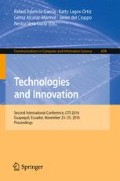Abstract
Fuzzy cognitive maps allow multi-expert causality modelling using linguistic 2-tuples values to improve the accuracy of the computing with words processes regarding classical symbolic approaches. Experts provide causal relations according to their knowledge, because they can have different educational backgrounds, or experiences. It seems logical that they might use different scales to express their mental models. In this work, we propose a new method for extending fuzzy cognitive maps, using the computing with words paradigm and the extended hierarchical linguistic model making it possible to model causal relation by means of linguistic information, where experts would use different linguistic scales to express causal relations. An illustrative example is shown to demonstrate the applicability of the proposed method in the modelling of interdependencies among nonfunctional requirements.
Access this chapter
Tax calculation will be finalised at checkout
Purchases are for personal use only
References
Pérez-Teruel, K., Leyva-Vázquez, M., Estrada-Sentí, V.: Mental models consensus process using fuzzy cognitive maps and computing with words. Ing. Univ. 19(1), 173–188 (2015)
Obiedat, M., Samarasinghe, S.: A novel semi-quantitative fuzzy cognitive map model for complex systems for addressing challenging participatory real life problems. Appl. Soft Comput. 48, 91 (2016)
Herrera, F., Martínez, L.: A 2-tuple fuzzy linguistic representation model for computing with words. IEEE Trans. Fuzzy Syst. 8(6), 746–752 (2000)
Espinilla, M., Liu, J., Martínez, L.: An extended hierarchical linguistic model for decision-making problems. Comput. Intell. 27(3), 489–512 (2011)
Axelrod, R.: Structure of Decision: The Cognitive Maps of Political Elites. Princeton University Press, New Jersey (2015)
Puente Águeda, C., Olivas Varela, J.A., Sobrino Cerdeiriña, A.: Estudio de las relaciones causales. Anales de mecánica y electricidad 87, 54–59 (2010)
Kosko, B.: Fuzzy cognitive maps. Int. J. Man Mach. Stud. 24(1), 65–75 (1986)
Papageorgiou, E.I., Salmeron, J.L.: A Review of fuzzy cognitive maps research during the last decade. IEEE Trans. Fuzzy Syst. 21, 67 (2012)
Ping, C.W.: A Methodology for Constructing Causal Knowledge Model from Fuzzy Cognitive Map to Bayesian Belief Network, in Department of Computer Science. Chonnam National University. Doctoral Thesis (2009)
Leyva-Vázquez, M., et al.: Técnicas para la representación del conocimiento causal: un estudio de caso en Informática Médica. Revista Cubana de información en ciencias de la salud 24(1), 73–83 (2013)
Leyva-Vázquez, M., et al.: Modelo para el análisis de escenarios basados en mapas cognitivos difusos: estudio de caso en software biomédico. Ing. Univ. 17(2), 375–390 (2013)
Papageorgiou, E.I., Stylios, C.D., Groumpos, P.P.: Introducing interval analysis in fuzzy cognitive map framework. In: Antoniou, G., Potamias, G., Spyropoulos, C., Plexousakis, D. (eds.) SETN 2006. LNCS (LNAI), vol. 3955, pp. 571–575. Springer, Heidelberg (2006)
Salmeron, J.L.: Modelling grey uncertainty with fuzzy grey cognitive maps. Expert Syst. Appl. 37(12), 7581–7588 (2010)
Iakovidis, D.K., Papageorgiou, E.: Intuitionistic fuzzy cognitive maps for medical decision making. IEEE Trans. Inf Technol. Biomed. 15(1), 100–107 (2011)
Khan, M.S., Quaddus, M.: Group decision support using fuzzy cognitive maps for causal reasoning. Group Decis. Negot. 13(5), 463–480 (2004)
Herrera, F., et al.: Computing with words in decision making: foundations, trends and prospects. Fuzzy Optim. Decis. Making 8(4), 337–364 (2009)
Pérez-Teruel, K., Leyva-Vázquez, M., Espinilla-Estevez, M.: A linguistic software requirement prioritization model with heterogeneous information. In: 4th International Workshop on Knowledge Discovery, Knowledge Management and Decision Support (EUREKA 2013), Mazatlán, México (2013)
Herrera, F., Martínez, L.: A 2-tuple fuzzy linguistic representation model for computing with words. IEEE Trans. Fuzzy Syst. 8(6), 746–752 (2000)
Espinilla, M., Liu, J., Martínez, L.: An extended hierarchical linguistic model for decision making problems. Comput. Intell. 27(3), 489–512 (2011)
Ejnioui, A., Otero, C.E., Qureshi, A.A.: Software requirement prioritization using fuzzy multi-attribute decision making. In: 2012 IEEE Conference on Open Systems (ICOS). IEEE (2012)
Sena-Montoya, É.: Estado actual de la investigación en requisitos no funcionales. Ing. Univ. 16(1), 225–246 (2012)
Chng, L., et al.: Non-functional Requirements in Software Engineering, vol. 5. Springer Science and Business Media, Berlin (2012)
Bendjenna, H., Charrel, P.-J., Zarour, N.E.: Identifying and modeling non-functional concerns relationships. J. Softw. Eng. Appl. 3(08), 820 (2010)
Chung, L., et al.: Softgoal interdependency graphs. In: Chung, L., Nixon, B.A., Yu, E., Mylopoulos, J. (eds.) Non-Functional Requirements in Software Engineering. International Series in Software Engineering, vol. 5, pp. 47–88. Springer, Heidelberg (2000)
Martínez, L., Rodriguez, R.M., Herrera, F.: Decision making in heterogeneous context: 2-tuple linguistic based approaches. In: Martínez, L., Rodriguez, R.M., Herrera, F. (eds.) The 2-Tuple Linguistic Model, pp. 51–82. Springer, Heidelberg (2015)
Author information
Authors and Affiliations
Corresponding author
Editor information
Editors and Affiliations
Rights and permissions
Copyright information
© 2016 Springer International Publishing AG
About this paper
Cite this paper
Leyva-Vázquez, M., Santos-Baquerizo, E., Peña-González, M., Cevallos-Torres, L., Guijarro-Rodríguez, A. (2016). The Extended Hierarchical Linguistic Model in Fuzzy Cognitive Maps. In: Valencia-García, R., Lagos-Ortiz, K., Alcaraz-Mármol, G., del Cioppo, J., Vera-Lucio, N. (eds) Technologies and Innovation. CITI 2016. Communications in Computer and Information Science, vol 658. Springer, Cham. https://doi.org/10.1007/978-3-319-48024-4_4
Download citation
DOI: https://doi.org/10.1007/978-3-319-48024-4_4
Published:
Publisher Name: Springer, Cham
Print ISBN: 978-3-319-48023-7
Online ISBN: 978-3-319-48024-4
eBook Packages: Computer ScienceComputer Science (R0)

